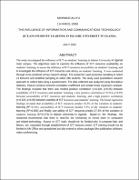| dc.description.abstract | The study investigated the influence of ICT on students’ learning in Islamic University in Uganda main campus. The objectives were to examine the influence of ICT resources availability on students’ learning, to assess the influence of ICT resources accessibility on students’ learning, and to investigate the influence of ICT resources user-ability on students’ learning. It was conducted through cross-sectional survey research design. The researcher used purposive sampling to select 13 lecturers and stratified sampling to select 286 students. The study used quantitative research approach to collect data using a questionnaire. The data collected was analyzed using descriptive statistics, Pearson product moment correlation coefficient and simple linear regression analysis. The findings revealed that there was modest positive correlation (r=0.428, p<0.05) between availability of ICT resources and students’ learning, a low positive correlation (r=0.234, p<0.05) between accessibility of ICT resources and students’ learning, and a high positive correlation (r=0.523, p<0.05) between usability of ICT resources and students’ learning. The linear regression findings revealed that availability of ICT resources predict 18.3% of the variation in students’ learning (R2=0.183), accessibility of ICT resources predict 5.5% of the variation in students’ learning (R2=0.055) and finally user-ability of ICT resources predict 27.3% of the variation in students’ learning (R2=0.273) in Islamic University in Uganda. Based on the findings, the researcher recommends that there is need for the University to invest more in computers and related technology. Access to ICT tools should not be limited only in computer labs and library but expanded through establishment of ICT resource centre. ICT training should not be limited to Ms Office and spreadsheet but also extend to others packages like publication software, video conferencing. | en_US |

